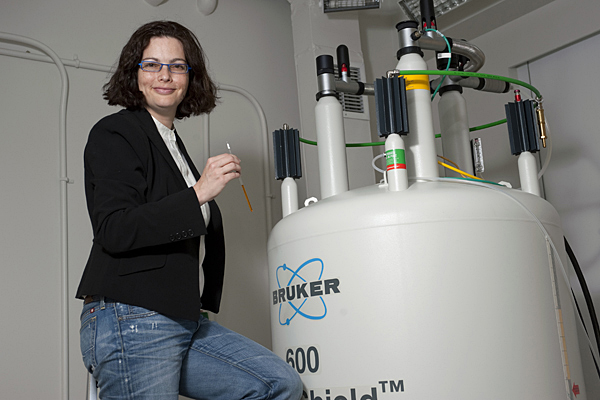
'PNAS' publication
Research on selenium in proteins published in national journal
9:05 a.m., April 25, 2014--The prestigious journal Proceedings of the National Academy of Sciences of the United States of America this week published an article by a research team led by University of Delaware biochemist Sharon Rozovsky, examining proteins containing selenium and their antioxidant role in human health.
The international group of researchers whose findings are described in the article, “Redox active motifs in selenoproteins,” also includes UD doctoral student Fei Li, 2010 UD alumna Yuliya Pepelyayeva, Patricia B. Lutz and Craig Bayse of Old Dominion University and Elias S.J. Arner of Karolinska Institutet in Sweden.
Research Stories
Chronic wounds
Prof. Heck's legacy
“Selenium in biological systems has long been studied for its role in aging, cancer and chronic diseases,” according to the journal article. Proteins, called selenoproteins, that incorporate selenium through the use of an amino acid “are rare [but] they are essential for mammals and have important roles in antioxidant defense,” the article says.
Such proteins also play a key part in chemical reactions known as redox reactions, which consist of reduction (the loss of oxygen) and oxidation (the gain of oxygen).
Rozovsky and her team used mass spectrometry and nuclear magnetic resonance spectroscopy to study selenium in redox biology, which the journal called a new approach that deepens scientific understanding of the chemical properties involved.
Rozovsky, assistant professor of chemistry and biochemistry at UD, received a National Science Foundation Faculty Early Career Development Award in 2011 to support her research on selenoproteins. At the time, she gave this description of her research focus:
“You have thousands of proteins in the human body, and only 25 contain selenium, so that suggests that selenium has a very special role. It's important for preventing cancer and also for longevity, so we want to understand how it functions.”
She also explained the significance of her research on enzymes that use selenium and that work as antioxidants in the human body.
“When cells make energy — through normal living — they produce oxygen, and that can damage the cells,” she said, adding that as that damage accumulates over years, it can result in diseases such as cancer and Alzheimer's. Selenium-containing proteins can help to both slow and prevent that damage from oxidation, she said.
Article by Ann Manser
Photo by Kathy F. Atkinson








